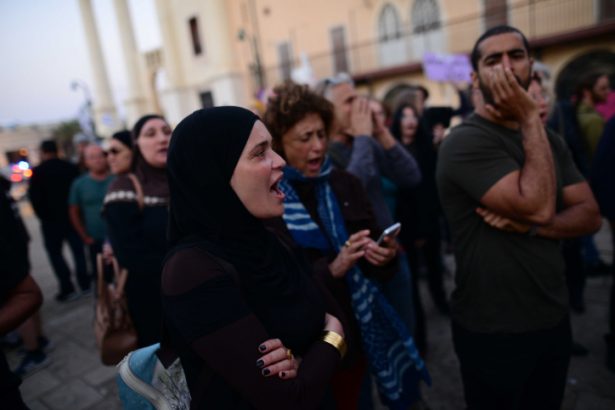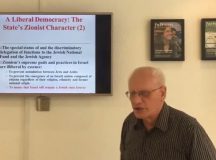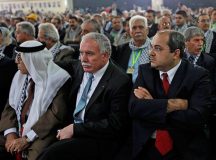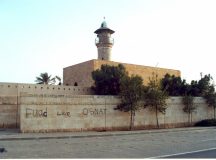In May 2021, for the first time in Israel, Arabs and Jews in the mixed cities of Haifa, Acre, Jaffa, Ramla and Lod, fiercely attacked each other, and a number of mob lynches were recorded in these and other cities. A month later, a new government, a coalition that for the first time in Israeli history includes an Arab party, came to power. What explains this unprecedented violence? How might power-sharing shape the prospects of Arab citizens in the Jewish state? How significant is the trend of ‘Israelisation’ among the Arab citizens of Israel?
The Arab-Jewish Divide in Israel
Like many minorities, Arabs in Israel (18 per cent of citizens and 21 per cent of permanent residents) are a low-status minority. Following the Government’s decision in 2015, Israel Central Bureau of Statistics started to monitor the wellbeing gaps between Arabs and Jews by 62 objective and subjective indicators that cover 11 areas of life: Employment, personal safety, health, housing and infrastructures, education, personal and social welfare, environment, civic involvement, material standard of living, leisure, and use of Information and Communication Technology. In 50 of the 62 indicators in 2019 the situation of Jews was better than the situation of Arabs, in three the situation of Arabs and Jews was equal, and in nine the situation of Arabs was better.
Some findings from this and other studies illustrate the wide intergroup gaps. 43.4 per cent of Arabs compared to 65.0 per cent of Jews are employed and earn 57 per cent of what the Jews earn; 83.0 per cent versus 92.1 per cent are satisfied with their work and 50.8 per cent versus 65.2 per cent with their economic situation. 23.3 per cent of Arabs versus 44.9 per cent of Jews qualify for admission to institutions of higher education and 37.0 per cent versus 59.4 per cent have post-secondary or college education. Arabs live three years less than Jews (men – 78.1 versus 81.7, women – 81.9 versus 85.1) and their infant mortality per 1,000 births is 5.3 (similar to 5.95 of OECD members in 2019) versus 2.2 among Jews. 3.9 Arabs per 100,000 are murdered compared to 0.6 of Jews. General trust in people among Arabs is 12.9 per cent versus 45.9 per cent among Jews; trust of government is 28.4 per cent versus 44.1 per cent; belief in ability to influence government policy is 5.7 per cent versus 16.7 per cent. Satisfaction with parks and green areas in region of residence is 16.3 per cent for Arabs compared to 68.7 per cent for Jews. 81.1 per cent of Arabs and 88.1 per cent of Jews use the Internet. On the other hand, Arabs are less vulnerable to cancer (224 versus 250 women per 100,000), their cost of housing services is lower (14.2 versus 22.6 per cent of income), and their trust of health institutes is higher (81.2 versus 70.3 per cent).
The share of Arabs in professions and management (23.5 per cent) is half of the Jews’ share (41.7 per cent), their poverty rate (45.3 per cent) is three times the Jewish rate (13.4 per cent), and their contribution to the gross national product (8 per cent) is half of their part in the labour force. Arabs’ poor performance in education is expressed in lagging behind Jews by three to four years in PISA test scores in reading comprehension, mathematics and science.
Arabs differ in religion, language, culture and identity from Jews. 90 per cent live in all-Arab villages and towns with limited space; receive poor municipal services; and their children attend ineffective separate schools in Arabic. They maintain their own media and NGOs and hardly use Jewish leisure areas. Only half of Arabs work in Jewish workplaces but in mostly low status jobs. They do not serve in the national security services and do not marry Jews.
Arabs are proportionately represented in the Knesset and head all their municipalities, schools and religious courts. They have four independent national political parties and two Islamic movements. Arab representative bodies have powers to call on all Arabs for mass protest demonstrations and general strikes. Yet, they do not share top posts in the executive and judicial branches. Only one Arab is currently on the Supreme Court and none is a director general of a government office. They do not head government firms and are underrepresented on their boards. They do not own or manage national corporations that strongly impact the economy (the Arab head of Bank Leumi is a striking exception). The Ministry of Education, not the Arabs, controls the separate Arab educational system (curriculum, principals, teachers). The PM office, not Muslims, rules the Muslim Waqf (in charge of religious endowments and confiscated Arab property in Israel proper).
Arab Civil and National Concerns
Civil Concerns
Considerable resources are required for tackling the long list of Arab civil concerns. First and foremost is a dire need of land for municipal development and building of schools, community centres, sidewalks, playgrounds, shopping malls and industrial parks. The continued Arab tradition to live in detached one-family buildings steadily worsens the distress of land shortage for housing. Confiscations of Arab lands during the first two decades of statehood exacerbated the land deficit. Lack of approved master plans prompts construction of many illegal buildings (estimated as 50,000) and, as a consequence, there are many destructions of buildings every year.
Arab municipalities are poorly managed and lack monies because of underdevelopment before 1948 and the scant number of the kind of industrial plants, commercial malls and government offices that would pay a high property tax. Arab schools suffer from crowded classes and inadequate teaching and curriculums. Arab schoolchildren learn Arabic, Hebrew and English, but often graduate mastering none, and as a result they experience difficulty in studying at a Hebrew-speaking university (there is no Arab university) and in entering senior positions in the state bureaucracy and private economy.
Two additional civil concerns are urgent. One is the lack of physical safety caused by a high rate of crime and violence in Arab communities, driven by organised crime, under-policing, high risk youths (40 per cent of Arab youths neither study nor work), large distribution of illegal firearms, clan quarrels, and deficient parental and community control in a modernising society. The other urgent concern is the unsettled Bedouins in the Negev. Numbering around 80,000, they live in 35 shanty villages, not recognized by the state, not connected to grids of water, electricity and sewage, and without municipal services. The state sees them as trespassers and rejects their demands for municipalisation and their large land claims. The lingering of their predicament is reflected in high crime, destitution, suffering and spread of polygyny (estimated as a third of families).
National Concerns
The list of national concerns is much more contentious, confirming that the Arabs in Israel cannot be extricated from the Palestinian people, the Palestinian-Israeli conflict and the struggle against Zionism. Most Arabs view themselves as Palestinian (only 35.9 per cent in 2019 defined themselves as Israeli Arabs compared to 47.1 per cent as Palestinians in Israel and 14.8 per cent as just Palestinians) and expect the Jews to respect their ties with the Palestinians. (These and the following figures are taken from the publication reporting survey findings of Arab and Jewish attitudes in 2019). Most of them (62.2 per cent) accuse the Jews of being responsible for the conflict with the Palestinians and support a two-state solution (70.5 per cent compared to 45.4 per cent of Jews) according to the PLO’s terms that are totally rejected by Jews – retreat to pre-1967 borders, dismantling of Jewish settlements, right of return to the Arab refugees, division of Jerusalem, a sovereign state with few restrictions, and release of the Palestinian security prisoners. They also demand the right of the ‘internal refugees’ (i.e Palestinian Arabs who left / were forced to leave their homes in 1948 but stayed within the borders of Israel, who amount to a fifth of Arabs in Israel today) to reconstruct their destroyed villages or be fully compensated for their confiscated property. They view Zionism as a colonial and racist movement (77.1 per cent in 2015) and demand Israel becomes a binational state that treats them equally both as individuals and as a collective.
Arabs’ civil and national concerns boil down to institutional and social discrimination and exclusion. They feel themselves to be second class citizens, discriminated against by the state. 67.2 per cent in 2019 believed that the state treats Arabs as second-class or as hostile citizens who do not deserve equality, and 78.3 per cent thought that “there is a lot of discrimination against Arabs in Israel.” They feel their concerns are disregarded and that the Jewish state caters to Jewish needs and neglects theirs. Arabs are discriminated against when they try to move to, or rent an apartment in a Jewish town, seek a non-manual job, travel abroad without facing humiliating airport security checks, or buy a state or a private Jewish land. They are ‘suspected citizens’ who must demonstrate loyalty to the state and trustworthiness to the Jews. They are excluded from Israeli elites.
The Arabs’ predicament has been exacerbated by the Covid-19 pandemic. Their share of the damage incurred (unemployment, family income, domestic violence, severe sickness and deaths) has been significantly greater than the national average. Much like ultra-orthodox Jews, this is mainly because of greater distrust of the authorities and a cultural tradition based on close social relations (extended families, weddings and mass prayers).
Government Policy
Israel’s policy toward the Arab minority is based on two principles. One is ‘integration without assimilation.’ Integration consists of the extension of civil rights to the Arabs, the acquisition of the basic patterns of Israeli culture by the Arabs, and their incorporation into public institutions. The Arabs become, through ‘Israelisation,’ bilingual and bicultural, accustomed to life in Israeli society and attached to the state. To prevent assimilation, Arabs are accorded separate schools and their life in separate communities is maintained. State authorities neither plan nor approve new mixed villages, towns and neighbourhoods. Arabs living next door to Jews are few. Israel does not have civil marriage. Interfaith marriages are rare and not normative. The ‘integration without assimilation’ policy is an accepted goal by both the Arab non-assimilable minority and the Jewish non-assimilating majority.
The other principle of policy is ‘not granting national collective rights to Arabs.’ The integration principle bestows on Arabs individual civil rights such as the right to personal safety, a fair trial and vote, as well as ethnic collective rights like a state support for retention of religion, language, culture and identity. At the same time Israel denies the Arabs any national collective right. It does not recognize them as a national minority and part of the Palestinian people. Palestinian identity is seen as subversive and most Jews (69.4 per cent in 2019) believe that an Arab citizen who identifies as ‘Palestinian Arab in Israel’ cannot be loyal to the state and to its laws.
In its Basic Laws Israel is defined as the homeland of the entire Jewish people (in Israel and abroad), not of its citizens. The state’s name, flag, anthem, calendar, holidays, commemoration days, heroes, and language of administration are Jewish. The state is Jewish in its demography and goals, and is supposed to preserve its Jewishness in perpetuity. It is forbidden to form a political party that rejects Israel as a Jewish state and an existing party that does so would be barred from participation in Knesset election (yet, the Supreme Court usually rules in favour of participation of Arab parties in elections because it does not view them as an immediate and clear danger). The Knesset forbids tabling bills to compromise Israel’s Jewish character.
A Jewish state is thus conceived as a state owned and controlled by Jews and not subject to any internal challenge, not even democratic. In 2006-7, the Arab academic and intellectual elite published four Future Vision Documents in which they condemn Israel as a colonial and undemocratic state and called for its transformation to a binational state. In response, the Chief of the Shin Bet declared that this demand was subversive and the agency would block any effort, even peaceful, to advance it.
The two principles of government policy express Israel’s special character. Unlike liberal democracies in the West, Israel’s democracy is ethnic, giving Jews favoured status. Israel does not have a constitution and its Basic Laws intentionally exclude equality (although the Supreme Court has ruled that the Basic Law: Human Dignity and Liberty, enacted in 1992, includes equality implicitly, but this ruling evidently lacks a constitutional potency). Israel is also a defensive democracy, equipped with laws and regulations to ensure its national security and Jewish identity. Seen as a security threat, Arab citizens are put under surveillance and their access to sensitive information and roles is restricted. They are denied cultural autonomy and a university of their own because of a fear that these facilities would become a base for nationalist empowerment and agitation.
These policies were aggravated under Benjamin Netanyahu’s rule (2009-2021). The core of his popularist strategy was the presentation of his right-wing supporters as true and patriotic Israelis, while framing all others (‘leftists’, the media, ‘elites’, the Supreme Court, the police, Arabs) as a potential enemy within. Many laws were enacted to curtail Arab electoral power and political activities. Informally and mostly directed against Arab citizens, penalties were imposed on public organisations that fund commemoration of the Naqba (the Palestinian disaster in 1948) and on public calls to boycott Israeli or Israeli-controlled institutions (like Jewish settlements in the West Bank). The electoral threshold was raised in 2014 from 2 per cent to 3.25 per cent (but in response the four Arab political parties formed the Joint List). The Nation-State Basic Law was enacted in 2018, making Israel the exclusive property of Jews, downgrading Arabic from an official to a ‘special state’ language, and encouraging the state to build communities for Jews only. It lacks an equality clause and ignores Arab citizens. Arabs feel dishonoured by the law and protested against it.
Yet, Netanyahu government policy also boosted Arab integration. In December 2015 the government adopted Resolution 922 to invest 10 to 15 billion shekels in five-year development of the Arab sector. This historic decision aims to advance the Arab population economically by allocating budgets in proportion to or even more than population size. For instance, Arabs will receive 20 per cent of the state budget for informal education, 25 per cent for day care centres, and 40 per cent for public transportation services. In addition, large sums of money were allocated for increasing the number of Arabs in higher education and in assistance to the Negev Bedouins. Several initiatives were undertaken to raise Arab employment in the high-tech economy and in the civil service.
Arabs’ achievements are impressive indeed. Their share of the medical staff is over 40 per cent, of the Technion students around 25 per cent, and of the public servants 12 per cent. There is a dramatic expansion of the Arab middle class, estimated as 25 per cent and consisting of teachers, physicians, nurses, lawyers, engineers, businessmen, building contractors, managers and the better-off in general. Arabs are needed for filling dire shortages of manpower in the high-tech, medical services, construction, engineering and practical engineering. According to the OECD, which Israel joined in 2010, the gross national product might soon fall if Arab participation (mostly Muslim women) in the economy does not rise significantly. It turns out that there is no contradiction between right-wing nationalist ideology and a policy to boost Arabs’ social mobility. It is further believed that greater integration of the Arab middle class in the Israeli economy produces calm and stability.
An Arab Party Enters Government in 2021
Unforeseen developments occurred in 2019-2021. Lacking an electoral majority, Netanyahu failed to establish a government. The anti-Netanyahu bloc could not use its slight advantage because a government dependent on the support of Arab parties was seen to lack legitimacy. Netanyahu accused the Arab parties of endorsing Palestinian terrorism and rejecting Israel as a Jewish state. Yet, in the fourth round of elections he desperately turned for backing to Ra’am, an Islamic Arab party. Ra’am, in turn, decided to split from the Joint List and declared its intention to join any government in exchange for policy changes in favour of the Arab minority. It was ready to enter a new Netanyahu government but the fundamentalist Religious Zionism Party vetoed this option because such government would not have Jewish exclusivity. In June 2021, the anti-Netanyahu bloc, a mix of eight parties on the right, centre and left, thus formed a coalition government in which Ra’am was a member. This move was forced upon the three right-wing parties in the coalition by their strong passion to get rid of Netanyahu and by the strategy of Ra’am to only demand resources and concessions on civil concerns without raising any Arab national concern.
Arab Unrest
Two noteworthy Arab outbreaks have occurred since the turn of the century, in October 2000 and May 2021. The trigger to both eruptions was Jewish or state actions that were perceived as attacks on the Al-Aqsa Mosque compound, a holy and national site for Arabs and Muslims around the world.
In the momentous October 2000 the Arab protest in solidarity with the Second Intifada and the police response turned into a mutually reinforcing violence that was further exacerbated by violent clashes between Arabs and Jews in the second part of the ten-day event. 13 Arabs were shot dead by the police and one Jew died of Arab stones. A state commission of inquiry accused the police of mishandling the event and not bringing to justice the suspected policemen, the Israeli governments for neglecting the Arab population and the Arab leaders for incitement. The Arab riot also caused a Jewish boycott of Arab businesses and reinforced the separation between the two communities.
The most recent riot in May 2021 has as its background the anti-Arab and anti-democratic steps, taken by the right-wing government, culminating in the Nation-State Law. The more direct cause was the violent confrontations between Palestinians and Jews in east Jerusalem (the threat to displace some Palestinians from their homes in Sheikh Jarrah near the Old City, the Palestinian anger at the deployment of police forces on the Al-Aqsa compound in reaction to stones thrown at them, the conspicuous rise in the number of Jews who went to pray on the Temple Mount, the injury of about 600 persons, most of whom Palestinians). These events triggered the Hamas to fire rockets toward Jerusalem and an Israel’s counter-attack in the form of Operation Guardian of the Walls.
Unlike the October 2000 unrest, which took place in various Arab locales, the ten-day outbreak in May 2021 took the form of violent Arab-Jewish clashes in mixed cities, as well as violent outbursts in many Arab villages and towns. Arabs and Jews attacked each other. We witnessed the mob lynching of several innocent passers-by, shootings, road blocking, stoning, vandalism, arson, looting, and violent demonstrations. Three Jews and two Arabs were killed and scores from both sides were wounded. Criminals and idle youths together with students and ordinary people took part in the Arab assaults. The Jewish attackers included not only Kahanists, marginal youths and some fundamentalist settlers, but also ordinary residents who reacted in self-defence and counter-attacks. The chiefs of the police and security services defined the clashes as pogroms and acts of terrorism. The police were taken by surprise and slow in reacting. Calm was finally restored by the police, the Border Guard, and the secret service. Many Arab lawbreakers were indicted along with some Jews.
Despite the severe rioting of both Arabs and Jews in 2021, no demand was voiced to appoint a commission of inquiry. Unexpectedly, people from both sides joined demonstrations calling for Arab-Jewish solidarity and cooperation. Amazingly, there was only a short suspension but no halt to the negotiations to build a coalition government including an Arab party. It was as if no violent outbreak had occurred. Indeed, a new government of unprecedented Arab-Jewish composition was installed a short time after the violence ended.
These two events are serious by Israeli but not international standards. Israel is a deeply divided society, no less so than Northern Ireland up to 1998, or Sri Lanka, Turkey, Sudan, Cyprus, or Yugoslavia during its breakup, to mention just a few. Yet, the impact of the ethnic conflict, measured by loss of life and property, governmental instability and recurrence of violence, is many times greater in these countries than in Israel. The parties in conflict in Israel are more restrained and less violent.
Still Playing by the Rules
The question, then, is why the state, the Jews and the Arabs continue to play by the rules. The Israeli state aims to remain the homeland of the Jewish people forever. It bases its self-image as a liberal democracy on granting Arabs individual civil rights and on a policy of bringing them to a par with the Jews. It expects Arabs to accept Israel as a Jewish state and to be satisfied with cultural collective rights without any national collective right. As a defensive democracy, it uses various mechanisms of control to deter Arabs from challenging the state’s identity.
The Jews agree with the way the Jewish state views and treats the Arabs. They have over the years learned that they can’t help but live with the Arabs. Following the state, the Jews sharply differentiate between Palestinian citizens in Israel and Palestinians under occupation in the West Bank and Gaza Strip. They are afraid of potential Arab dangers – demographic increase, popular revolt and participation in the violent Palestinian resistance. Jewish opinion varies according to political orientation. The more right wing and religious the Jew is, the more scared, rejecting, discriminating and exclusionary of Arabs he or she will likely be. Jews on the right prefer Israel to be more Jewish than democratic and, for them, Arab citizens are less acceptable. Jews on the centre-left prefer Israel to be more democratic than Jewish and, for them, Arab citizens are more acceptable.
The state and the Jews still play by the rules because they created the Jewish state and set the rules so that they will serve their own needs and interests. But why do Arabs play by the rules? They do so because they lack a better alternative and are fearful of the strong punitive power of the state. While these two conditions are necessary, they are not sufficient to account for Arab compliance since the end of the military government in 1966 and the beginning of occupation in 1967. The state applies these two conditions also to the Palestinians in the West Bank and Gaza but fails to mollify them. A more satisfactory explanation would also look to the positive forces at play. Arabs in Israel are citizens who avail themselves of democratic rights, welfare state benefits, access to a modern way of life, continuous social mobility, protection against Islamic fundamentalism, exemption from military service and immunity from assimilation. When asked if they would move to a new Palestinian state, they unequivocally say no, and feel insult and anger at the proposal made by some Jewish right-wing politicians that the Triangle (an Arab region along the Green Line) could be ceded to the state of Palestine. Most Arabs (57.2 per cent in 2019) feel that Israel is a good place to live and prefer (55.6 per cent) to live in Israel than in any other country in the world. Contrary to their political leaders and academic elite, they accept Israel as a Jewish (but not a Zionist) state, while seeking civil equality for themselves and a sovereign state for the Palestinians.
Israelisation
The overall trend of development of the Arabs in Israel is towards Israelisation. They are developing as a separate and a different segment of the Palestinian people. Unlike the Palestinians in the occupied territories , who are engaged in violent resistance against and in separation from Israel, the Arab citizens of Israel are increasingly struggling for greater integration and equality in Israeli society. As Israelis, they do not tolerate discrimination and exclusion and insist on equal treatment by the state and the Jews.
Israelisation takes place along with Palestinianisation and Islamisation, trends which make the Israelised Arabs more Palestinian and more Islamic. Their distinct character and fate are reflected in their sharp difference from un-Israelised Palestinians and from Israeli Jews and in their special relations with Jews – integration without assimilation. They integrate in workplaces, shops and public space but not in communities, schools, political parties, and families. They keep their religion, language, culture and identity. They are Israelis with a Palestinian identity and Palestinians with an Israeli identity. The Arab outbreaks in October 2000 and in May 2021 were not rebellions against Israel per se but rather protests against discriminatory treatment and in favour of solidarity with the Palestinians.
Political Legitimacy
Arabs historically did not take advantage of the most effective way to improve their condition – the participation of Arab parties in government coalitions. Arab parties are not invited to join coalitions because of their rejection of Israel as a Jewish state and alleged support of the Palestinian enemy. They themselves are reluctant to enter coalitions for exactly the same reasons. Only in 1992-96 was the Rabin-Peres minority government forced to rely on ‘support from the opposition’ of two Arab parties. Appreciable resources and the Oslo Accords were the rewards for the Arab support at that time.
The four rounds of Knesset elections in 2019-21 did not produce a clear majority. The Jewish parties had to face the sobering reality that a government could not be established without the support of an Arab party. As mentioned above, the Ra’am Party broke away from the Joint List and launched a new strategy in Arab politics: joining any coalition in exchange for resources and policy changes in favour of the Arab population, while remaining silent on national issues. Several factors impelled this shift in strategy. Arabs’ growing Israelisation has intensified their pragmatism, a preference for problem-solving and practical solutions rather than ideological visions. A vast majority of 80.4 per cent of the Arabs in 2019 agreed that the Arabs should fight more for civil and socioeconomic equality and less for peace and change of the state’s character. This turn to pragmatism has been reinforced by the increasing urgency of the daily problems facing Arabs. Public opinion surveys have shown for years that Arabs (66.0 per cent in 2019) do not trust their political leaders because they have failed to ameliorate Arabs’ daily lives. They have long wanted (87.2 per cent in 2003 and 71.9 per cent in 2019) Arab parties to join coalition governments to effect change. The growing marginalisation of the Israeli-Palestinian conflict in the life of Arab and Jewish Israelis was further marked by the 2020 Abraham Accords, and this too has played a role by driving Arab struggle from national to civic aims. The political splitting was also driven by the liberalism, mixed with conservatism, of the Joint List. As a party of the moderate southern Islamic Movement in Israel, and part of the global Muslim Brothers Movement, Ra’am espouses a conservatism that is in tune with the semi-modern Arab society (the most divisive controversy is the voting of Arab Knesset Members on LGBTQ rights). Yet none of this could have caused Ra’am to split without the stalemate in Jewish politics, the necessity to include an Arab party in a government coalition, and the belief of Ra’am leaders that their party was strong enough risk standing alone and still passing the Knesset threshold (the minimum is 4 of the 120 seats).
Ra’am’s bet was successful. It became a member of the new coalition but chose not to accept appointments as government ministers. It was promised considerable investments in the Arab sector, state recognition of several unrecognised Bedouin villages in the Negev, an urgent war on crime and violence in the Arab population, and much more. On October 25, 2021 the government adopted a new program for the Arabs. Of the new massive allocations of 30 billion shekels for the years 2022-2026, 2.5 billion were earmarked for fighting violence and crime, 9.4 billion for improving Arab education, and various funds for closing the Arab-Jewish gaps in various areas. Ra’am took the credit for the new grand program and Mansour Abbas, its leader, declared that it is changing Israel’s society and politics and from now on it will only be natural that Arab parties will be part of government coalitions.
Conclusion
Is the rise of an Arab party able to join a government coalition a game changer in Arab politics and Arab-Jewish relations? Can the historically unprecedented become routine Arab politics and normalise Arab-Jewish relations? Certainly, it is clear that Arab political parties can now accumulate power, similar to that of ultra-orthodox parties, and use it to advance their interests within governing coalitions. It has been astonishing to witness Ra’am’s participation in national priority-setting and budgets and its impact on bills initiated by the government.
The obstacles to political integration of Arab parties remain serious, however. The political deadlock in Israeli politics was caused by Netanyahu’s insistence to stay in power despite his trial on charges of bribery, fraud, and breach of trust. Once he steps down, the political right may well restore its majority and form a government without an Arab party. Ra’am’s success depends on its ability to deliver the goods to the Arabs, and if the change will be too slow or not felt enough by the Arab public, the party might lose support. It is doubtful that its participation in the coalition could survive a third Palestinian Intifada, a war with Hezbollah and Syria, or an Israeli Arab Intifada.
Ra’am’s gravest weakness is the conditional nature of the political legitimacy that has been extended to it within a divided Arab politics. The Joint List condemns Ra’am as a collaborator because its fight is restricted to socioeconomic benefits only, as if the Arabs do not have any national goal. It further charges that Ra’am plays into the hands of the Jews who degradingly differentiate between a ‘good’ and a ‘bad’ Arab (in Jewish eyes, a ‘good Arab’ neither publicly identifies oneself as Palestinian nor openly objects to occupation). Indeed, the legitimacy of participation in coalitions is – at least for the right – accorded exclusively to Ra’am (a ‘good Arab’) and denied to the mainstream Joint List (a ‘bad Arab’). Nonetheless, irrespective of this deepening split in Arab politics, the Arabs will judge Ra’am not by its innovative strategy (‘influence’ instead of ‘protest’) but rather by its real impact on their daily lives.
It is too early to tell whether or not the new political integration of the Arabs is a game changer. At any rate, Arab-Jewish coexistence is sustainable and far from approaching the violent collapse that many fear.





































